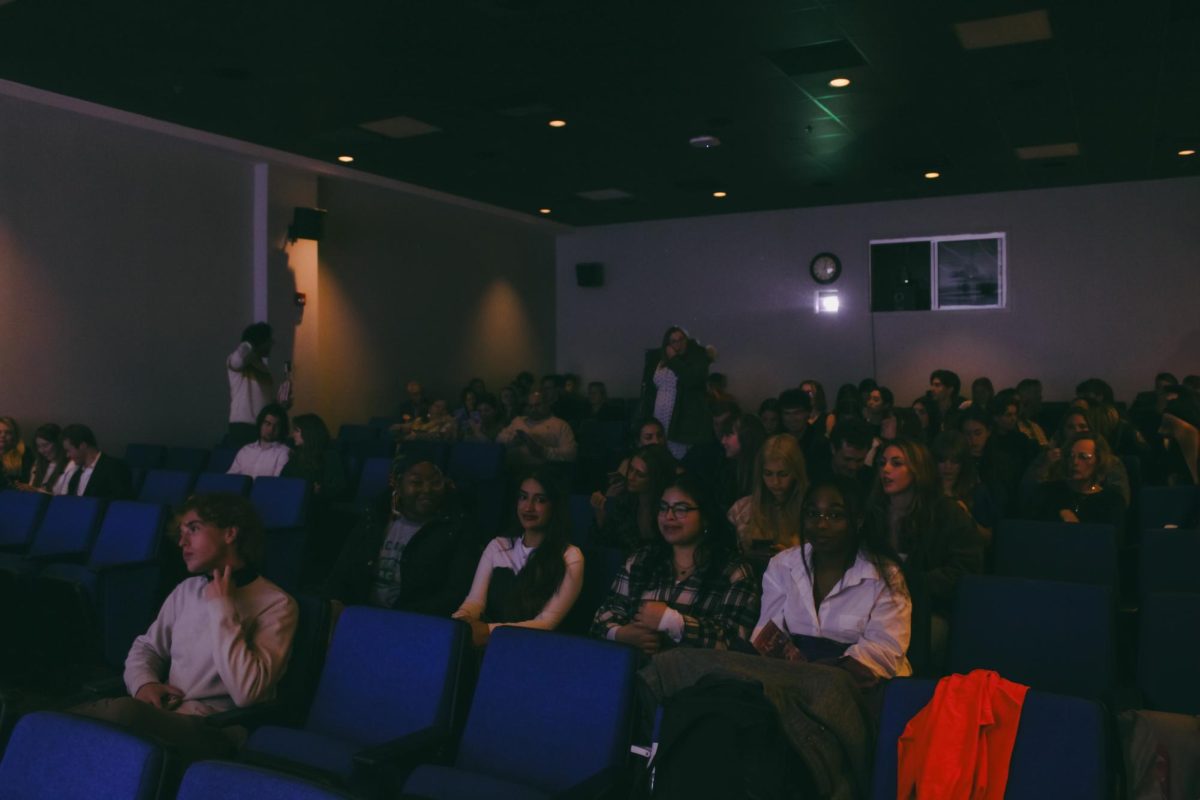Jan. 31 began Clemson’s annual hosting of the Tournées Film Festival. The Tournées Film Festival is a nationwide event sponsored by the FACE Foundation, which strives to bridge the gap between French and American arts. Since 1995, they have partnered with over 600 American universities to professionally screen a selection of contemporary and classic French films. Clemson’s Arts and Humanities team has chosen six to be shown from the foundation’s collection that convey community and belonging, along with a bonus showing. The following is the schedule and short synopses for the films. All descriptions (except for Mariannes Noires, which is from here) are from the pamphlet available from here.
Jan. 31 at 6:30 p.m.: “Visages, villages” (“Faces, Places”)
With “Faces, Places,” 89-year-old powerhouse Agnès Varda teams with the world-famous young street artist JR to make a film as wide-ranging as it is personal, as fanciful as it is pointed. Setting off on French country roads to find subjects for JR’s trademark mural-size portrait photographs, the two artists focus on people generally outside of the spotlight: retired miners, factory workers, farmers and the wives of dockers. Each encounter fills in another piece of an idiosyncratic portrait of modern-day France, as well as the evolving relationship between open-hearted Agnès Varda and mysterious JR. The give-and-take between Varda and JR plays out in a fascinating through-line devoted to Jean-Luc Godard, Varda’s old friend and sole surviving colleague of the French New Wave. But make no mistake: while the film is credited to both artists, Varda is definitely calling the shots. As ever, her montage is allusive, playful, rapid-fire, occasionally jarring— in short, totally in keeping with her singular way of thinking. Her generosity in sharing her life and thought with us deep into her old age is a cause to rejoice. “Faces, Places” was nominated for an Academy Award for the Best Documentary of 2017. The trailer can be found here.
Feb. 5 at 6:30 p.m.: “I Am Not Your Negro”
Haitian filmmaker Raoul Peck’s brilliant documentary on racism in America is an essential work for our era, drawing a clear line from the Civil Rights struggle to today’s Black Lives Matter movement via the thought of James Baldwin, one of the most lucid, fearless American thinkers on race (and many other matters). Based on Baldwin’s unfinished manuscript “Remember This House,” which considered the history of racism through memories of Baldwin’s friends: the civil rights leaders Martin Luther King Jr., Malcolm X and Medgar Evers, “I Am Not Your Negro” analyzes white denial and black experience of racial oppression in a historical and contemporary context, bringing Baldwin’s observations into the present through powerful juxtapositions of his words (read in voiceover by Samuel L. Jackson) and, for instance, images of the Ferguson protests. Peck also generously culls from archival sources, notably the extensive talk show appearance in which Baldwin, an eloquent and spirited orator, publicly expresses that the “negro” is a white construct, and anything but a definition of who he is. By providing an impassioned, accessible introduction to James Baldwin’s work and thought, Peck has given us a crucial reference to address ongoing injustice in the United States. The trailer can be found here.
Feb. 7 at 6:30 p.m.: “Moi, un Noir” (“I, a Negro”)
Few films have had as sweeping an impact as Jean Rouch’s 1958 portrait of three Nigerian migrants in Treichville, a bustling neighborhood in Abidjan, Ivory Coast. As an ethnographic film, “Moi, un Noir” was both politically and aesthetically revolutionary through its attempt to address the problem of the ethnographer (nearly always a white man) filming subjects (nearly always people of color) objectified and stripped of agency by the filmmaking process. Here, Rouch began by filming his friend Oumarou Ganda (later to become a pioneer of African cinema) and two other young men seeking their fortune in Abidjan, inviting them to improvise scenes as they worked the docks by day and dreamed of a better life by night. He then asked Ganda to add his own voice-over commentary to the images of himself and his friends. And so, the documentary became a shared project, in which the people on screen actively participated in their representation and revealed not only the surface of their daily lives but the stuff of their dreams. This vibrant, rough-hewn film had a determining influence on the French New Wave and the cinéma vérité movement of the sixties. It remains a touchstone for today’s documentary/fiction hybrids. The trailer can be found here.
Feb. 12 at 6:30 p.m.: “Le Grand Méchant Renard et autres contes” (“The Big Bad Fox and Other Tales”)
Adapted from an acclaimed series of comic books written and illustrated by co-director Benjamin Renner, “The Big Bad Fox and Other Tales” is a delightful animated film, charmingly old-fashioned in its graphics but sly and witty in its contents. Consisting of three stories featuring a recurring cast of hapless farm animals, the film is presented as a theatrical revue, with the “big bad” fox (who is, in fact, anything but) appearing on a stage before each segment to introduce the action. The first story features the adventures of a rabbit, a pig, and a duck who take over for the stork when she gets sick and try to bring a human baby to its parents. This is followed by the story of the fearful fox who is so bad at being a predator that he winds up protecting three chickadees from a wolf. The final story finds the rabbit and the duck attempting to deliver presents on Christmas Eve after they destroy a plastic Santa Claus and become convinced they’ve killed the real one. Combining an infectious warmth and a surprising slapstick sensibility, “The Big Bad Fox” is a treat for the whole family. The trailer can be found here.
Feb. 14th at 7:00 p.m.: “Le Crime de Monsieur Lange” (“The Crime Of Monsieur Lange”)
One of the liveliest films from French cinema’s abiding master, “The Crime of Monsieur Lange” starts with a couple arriving at an inn on the French border with instructions to escape to Belgium the next morning. The innkeeper and his clients soon identify the man as the wanted murderer Monsieur Lange; while he sleeps peacefully, his companion Valentine throws herself upon their mercy by telling the story of his relationship with their employer Batala, a crooked publisher who abused his employees and creditors. In a single long flashback, we learn of Batala’s mysterious disappearance and witness his publishing company turn into a thriving cooperative in which every worker has a say. For a time, a small utopia takes root around the Paris courtyard where the printing presses run and Lange and Valentine fall in love. Until Batala reappears… The Crime of Monsieur Lange is Renoir’s inspiring political manifesto, a film dedicated to egalitarianism both in its narrative and its way of taking an affectionate, lingering interest in a wide variety of characters. It is also a timely look at relations between men and women, blunt in its outrage over workplace abuses and sophisticated in its representation of women’s desire. The trailer can be found here.
Feb. 19 at 6:30 p.m.: “120 Battements par minute” (“BPM (Beats Per Minute)”)
“BPM” is a fictionalized account of the history of ACT UP Paris, the triumphant true story of some of the great heroes of our era: the men and women who fought for the recognition and improved treatment of HIV and AIDS patients at a time when a diagnosis was a death sentence. As an original member of ACT UP, writer-director Robin Campillo brings a detailed, thoroughly researched authenticity to his reconstruction of the activist organization’s politically and emotionally charged group meetings, its colorful protests and the intimate relationships that bound the tight-knit group together. Yet “BPM” is anything but a dry history lesson: Campillo intelligently divides the film in two sections, the first of which establishes ACT UP’s historical importance by focusing on its internal dynamics and political actions, while the second delivers the emotional punch of its impact on individual fates through a love story between two of its members, one of whom is dying of AIDS. In crafting this remarkable elegy, Campillo achieves a rare blend of celebration and outrage, remaining true to the activists’ determination, humor, and youthful vibrancy. Above all, “BPM” is a remarkable testament to the power of regular citizens to effect change by banding together to demand justice. The trailer can be found here.
Feb. 27 at 6:00 p.m.: “Mariannes Noires”
Seven Afro-French women investigate the pieces of their mosaic identities and unravel what it means to be French. Kaytie Nelson, the filmmaker, will also be coming for a discussion after the film. The trailer can be found here.
Anyone who is a fan of French culture, cinema, or just wants to try something new is encouraged to come for an entertaining evening. And if the first night was any indication of the quality of film and discussion for the rest of the week, you’ll likely see me there too. All showings will be open to the public and held at McKissick Theatre in the Hendrix Center.
Categories:
Clemson’s annual Tournées Film Festival begins
Judson Greene, TimeOut Senior Staff Writer
February 10, 2019
0
Donate to The Tiger
Your donation will support the student journalists of Clemson University. Your contribution will allow us to purchase equipment and cover our annual website hosting costs.
More to Discover








